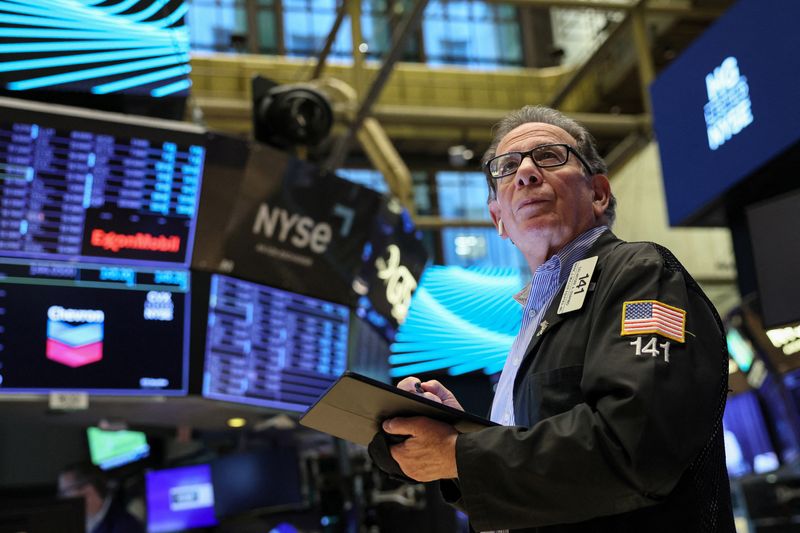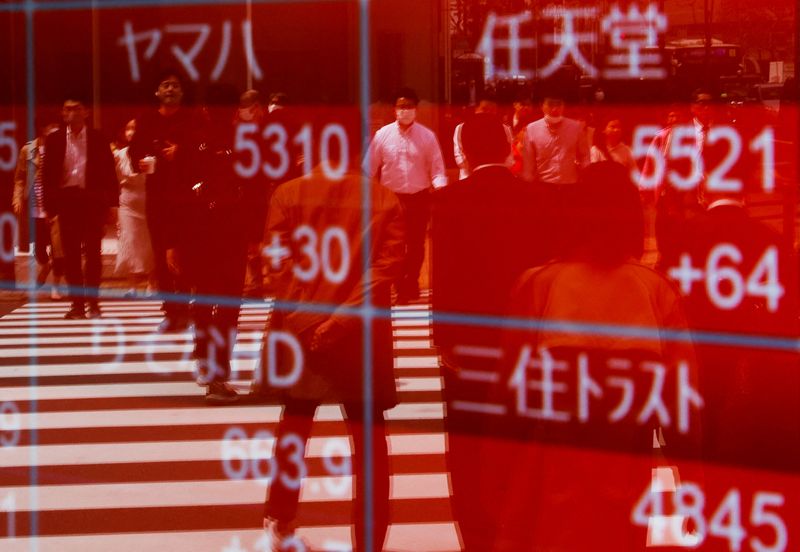By Koh Gui Qing and Marc Jones
NEW YORK/LONDON (Reuters) -World stocks snapped a five-day rally on Thursday as investors took a breather, while oil prices slumped almost $4 per barrel to a four-month low, on signals of higher U.S. supply and lackluster Chinese demand.
By the end of the session, MSCI's gauge of stocks across the globe edged down 0.13%, and shares on Wall Street notched modest gains or losses.
The Dow Jones Industrial Average lost 0.13%, the S&P 500 added 0.12% and the Nasdaq Composite was barely changed.
The mood on Wall Street was not helped by a plunge in the shares of Cisco Systems (NASDAQ:CSCO) and Walmart (NYSE:WMT) following underwhelming forecasts for demand. [.N]
Some analysts thought that equity markets were not likely to lurch sharply lower for now, despite recent sharp gains, as investors celebrate the prospect that U.S. interest rates might have peaked.
"Upside risks to inflation and downside risk to growth mean the risk-positive data flow is unlikely to last through 2024, but it's not clear there will be sufficient data to refute the happy, if probably unsustainable, narrative before the end of the year," analysts at Citi said.
That said, oil prices dived to levels last seen on July 7, with U.S. crude sliding 4.9% to $72.89 per barrel and Brent was at $77.46, down 4.6% on the day.
Oil prices are tumbling in part because U.S. crude stocks rose by 3.6 million barrels last week to 421.9 million barrels, government data showed on Wednesday, far exceeding analysts' expectations in a Reuters poll. [EIA/S][O/R]
Over in Europe, the pan-European STOXX 600 index lost 0.72% from a one-month high.
The U.S. dollar slipped after data showed the number of Americans filing new claims for unemployment benefits hit a three-month high last week, pointing to a slowing labor market that could help the Federal Reserve's fight against inflation.
The dollar index narrowed earlier losses and was flat, while the euro was also little changed at $1.08485. [USD/]
Dollar weakness benefited gold prices, which jumped 1.2% to $1,980.42 per ounce. [GOL/]
Indications of a cooling U.S. labor market weighed on Treasury yields. [US/] Benchmark 10-year notes were down 9.2 basis points to 4.445%, from 4.537% late on Wednesday.
The 2-year note was last was down 8.5 basis points to yield 4.846%, from 4.916%.
"If you don't get confirmation of the slowing economic direction from every single piece of data every single day, we risk running out of momentum on the big trades," Societe Generale (EPA:SOGN) FX strategist Kit Juckes said. "Until we get to the point where rate cuts are just around the corner, everything is going to be very stop-start. The dollar sell-off is stop-start, the bond market rally is really stop-start and the equity market is all over the place."
Germany's 10-year bond yield dipped to a near two-month low of 2.588%, while sterling sank to a six-month low against the euro as dealers in London inched closer their predictions on when the Bank of England (BoE) will start cutting rates. [EUR/GVD][GBP/]
Many now think it might be as soon as May, although BoE policymaker Meg Greene warned that investors are missing the message that central banks have been pushing recently that interest rates will remain higher for longer.
"I think markets globally haven't really clocked on to this," Greene told Bloomberg Television, adding that the BoE was not talking about cutting rates.
CHINA PROPERTY
Asian stocks fell overnight as new data from China showed continued weakness in its problem-hit property sector, which dented recent optimism about a recovery in the world's second-largest economy.
While data this week showed China's industrial and retail sectors are now making a comeback, figures have also shown a sharp drop in property investment and weak home prices, underscoring the ongoing drag the sector is having.
There was mixed news from Japan too, where exports grew for a second straight month in October but at a sharply slower pace due to slumping China-bound shipments of chips and steel.
"The weak economic data from both countries indicate the fact that the global economy is slowing down, highlighting ongoing macro headwinds that businesses face," said Tina Teng, market analyst at CMC Markets.

Chinese stocks showed some disappointment at the first meeting in years between U.S. President Joe Biden and Chinese President Xi Jinping, with Shanghai's blue-chip CSI300 index closing down 1% and Hong Kong's Hang Seng index ending 1.3% lower. [.SS]
While the two leaders agreed to resume military-to-military communications and cooperate on anti-drug policies, a sign ties are improving, some investors were disappointed at a lack of other breakthroughs.
